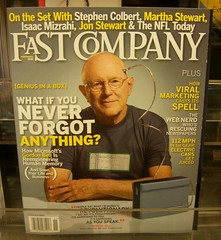Sitting in the doctor’s office today waiting for a routine exam (Big Announcement: for those that don’t know, I am having a baby in July), I started to read some of the outdated magazines that seem to litter doctor’s offices.
I came across a November 2006 issue of Fast Company with an intriguing article written by Clive Thompson outlining Microsoft Research employee Gordan Bell’s experiment to store his entire life in a Dell computer. Bell’s experiment is called MyLifeBits.
Bell records, videotapes, and scans in nearly everything to the project (save certain conversations with his wife, which she has smartly outlawed).
The story drew my attention for a few reasons, one of which is that by being a digital personality and writing this blog, plus belonging to about a dozen social networking sites, in some very real ways I have opted in to this type of digital cataloging myself.
I didn’t remember knowing much about this project, so when I got back to the office I started to type MyLifeBits into my Google search bar and it automatically added the word, “project.” So, sometime in the not-to-distant past, I must have searched on this topic – which sort of illustrates, in a way, what the project is about.
Unlike Bell, I do not carry around a personal recorder to catch every conversation, not do I wear a camera around my neck, but in some very real ways, I do rely on my digital identity to help me store my memories. Bell proposes that to some degree or another we all are doing this. One that hits me at home is my electronic calendar. If an appointment isn’t in my Outlook, and then transferred to my Treo, it simply doesn’t exist.
In the Fast Company article, Bell argues that the “choice isn't whether you'll join the revolution but whether you'll embrace it.”
I wonder if the concept of a digital file cabinet as a supplemental storage area for your brain is really all it is cracked up to be. Remember the claims that the computer would revolutionize the office, that people would have more time, and that paper would be completely eliminated? I don’t know about you, but my desk is still full of paper and I most certainly don’t work less because I have a computer.
Then again, I do rely heavily on my computer to help me fill in the blanks of my memory. In this post alone I used Google to pull up the article with the autocomplete reminding me that I have searched about this before, I used my “find” button to pull the relevant information out of article and I used the collective brain of Flickr to illustrate the post. But the question remains, “How do you keep track of all of your digital footprints?”
“MyLifeBits is now so big that it faces a classic problem of information management: It's hellishly difficult to search, and Bell often finds himself lost in the forest. He hunts for an email but can't lay his hands on it. He gropes for a document, but it eludes him.”
But researchers at Microsoft and beyond are developing better software applications to find all of the stuff that we seem to like to store.
My question is what if the hard drive crashed and you “lose” your memory, then what? Also, I take some comfort in “forgetting” certain aspects of my past. I am not to keen with these being brought up at inconvenient times.
What do you think? How does digital storage assist us and in what ways can it come back to bite? Are you comfortable with having a digital identity and having it follow you forever?
Photo from Brewbooks Photostream
